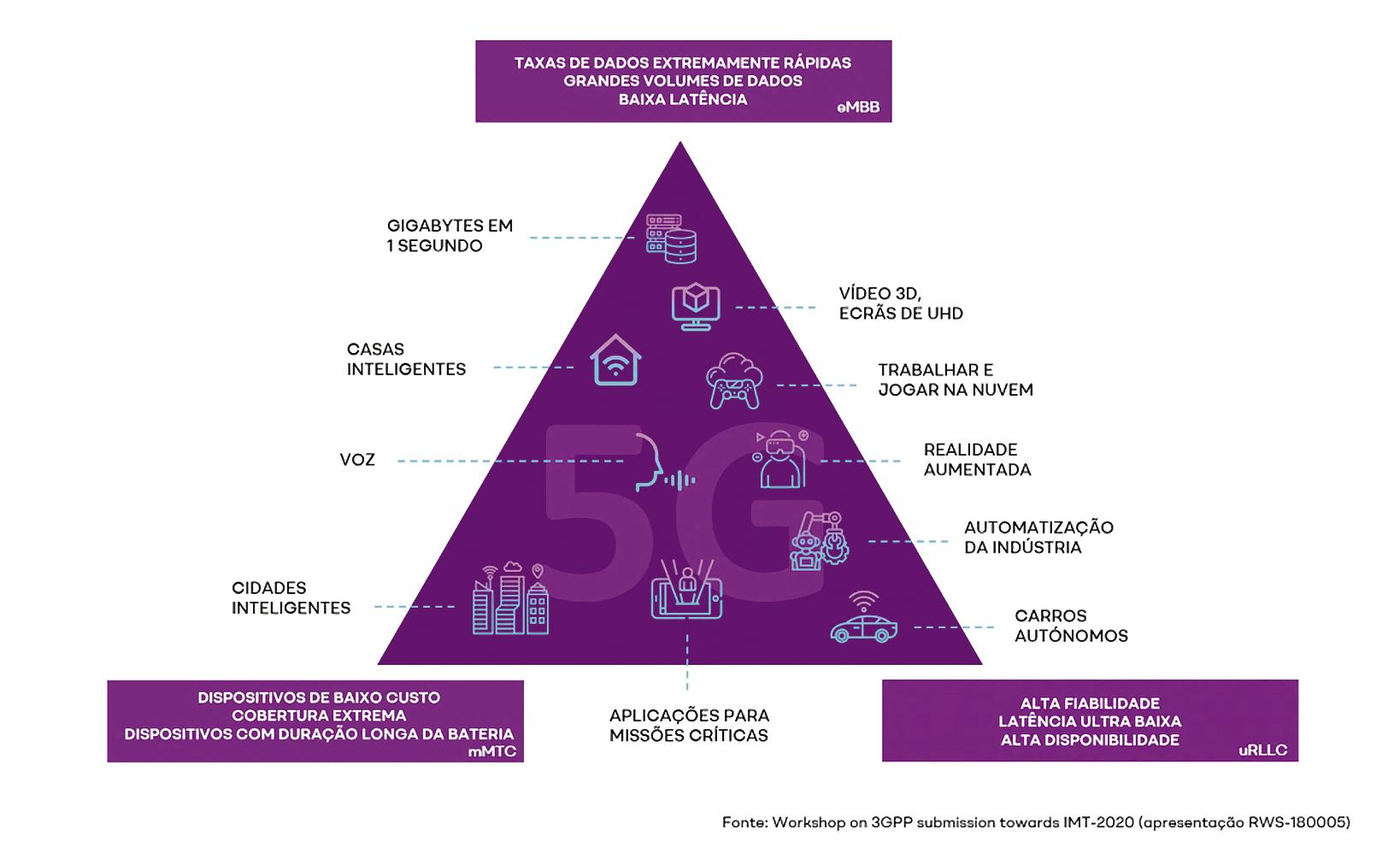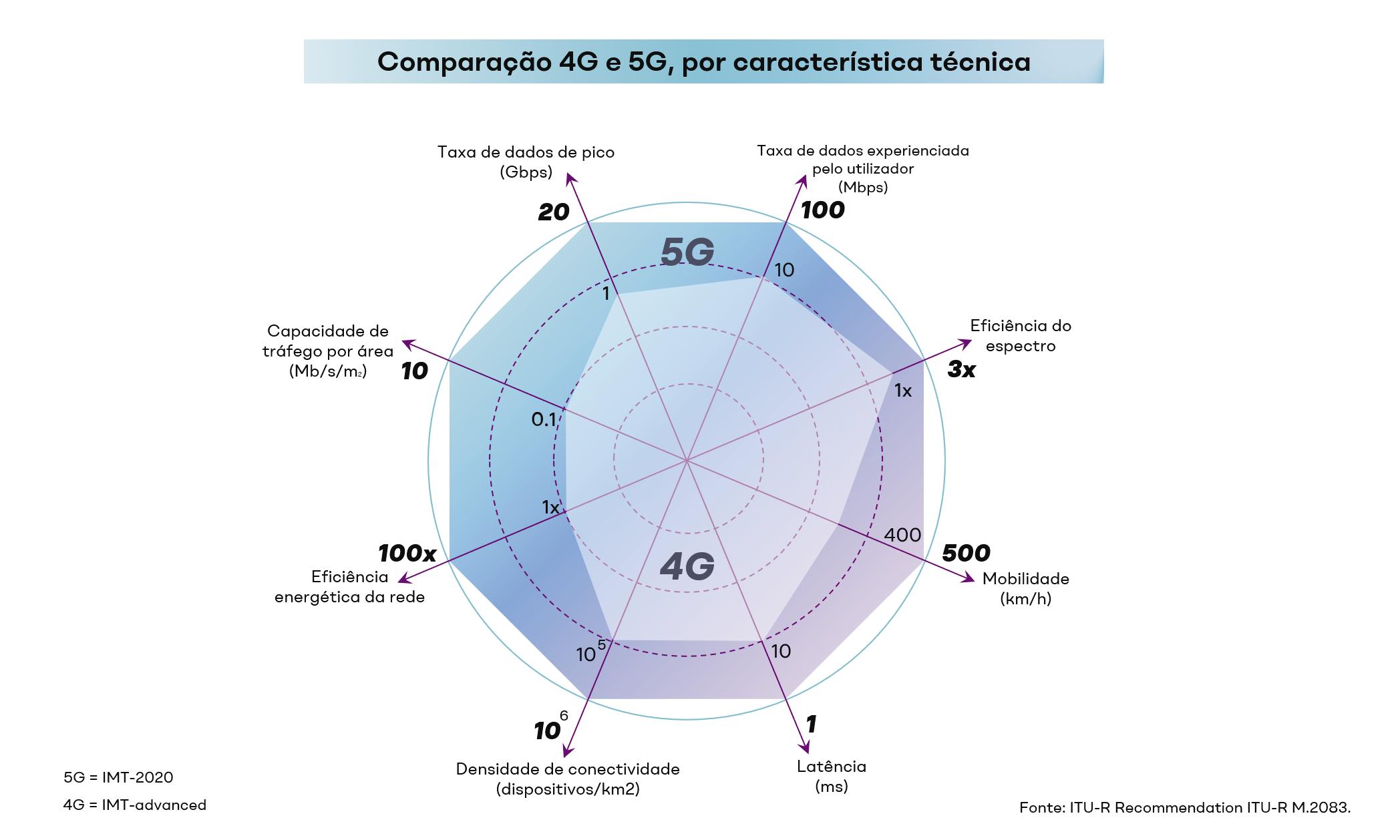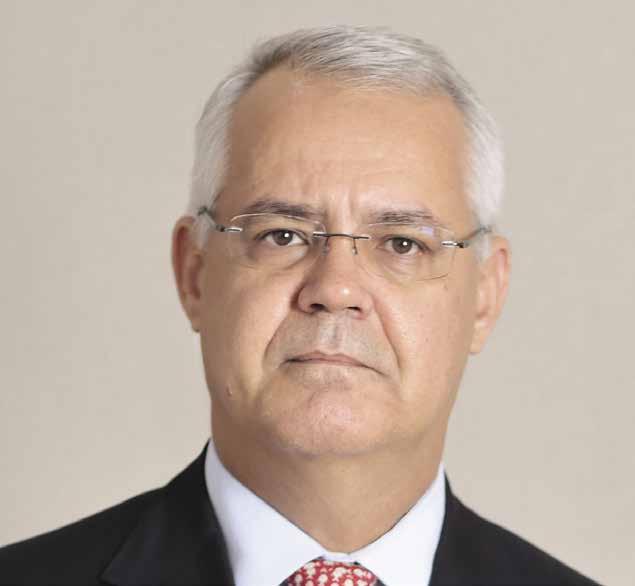
6 minute read
O 5G EM PORTUGAL 5G IN PORTUGAL Jaime Lino Neto e Catarina de Medeiros
CATARINA DE MEDEIROS CARREIRO,
ABREU ADVOGADOS
Advertisement
JAIME LINO NETO,
ABREU ADVOGADOS
O 5G EM PORTUGAL
5G IN PORTUGAL
O5G (a quinta geração de rede móvel) será um dos dinamizadores da implementação de novas tecnologias durante a próxima década, sendo frequentemente anunciadas as vantagens desta tecnologia disruptiva. Em particular, antecipa-se que, em comparação com o 4G, o 5G proporcione velocidades mais rápidas, ligações mais fiáveis e latências mais baixas (ou seja, menor atraso entre a ordem e a ação), resultando na transação de um maior volume de dados e na capacidade de servir de forma flexível segmentos com grande necessidade de largura de banda. Estes elementos dinamizadores do 5G poderão vir a revolucionar a maneira como atualmente vivemos, tornando as experiências digitais cada vez mais imersivas, hiperpersonalizadas e em tempo real, acentuando a transição entre um mundo ‘offline’ (analógico) e um mundo ‘online’ (digital). Em Portugal, a Autoridade Nacional de Comunicações (“ANACOM”) determinou que, para a atribuição dos direitos de utilização de frequências do 5G às operadoras de telecomunicações (nas faixas dos 700 MHz, 900 MHz, 2,1 GHz, 2,6 GHz e 3,6 GHz), seria adequado um processo de seleção por concorrência, mais concretamente um leilão. Neste contexto, a ANACOM aprovou o Regulamento que estabelece as regras de funcionamento 5 G (the fifth-generation mobile network) will be one of the drivers of the implementation of new technologies during the next decade and the advantages of this disruptive technology are announced every day. It is anticipated in particular that, compared to 4G, 5G will provide faster speed, more reliable connections and lower latencies (i.e. less delay between order and action), thus enabling more flexibility as to the transaction of a higher volume of data and the ability to cater for segments with high bandwidth requirements. These dynamic elements of 5G could revolutionize the way we currently live, making digital experiences increasingly immersive, hyper-personalised and in real-time, increasing the transition between the offline (analogue) world and an online (digital) world. In Portugal, the National Communications Authority (“ANACOM”) established that, regarding the allocation of rights of use of 5G frequencies to telecommunications operators (in 700 MHz, 900 MHz, 2.1 GHz, 2.6 GHz bands and 3.6 GHz), a competitive selection process, more specifically an auction, would be more appropriate. ANACOM thus approved the Regulation that establishes the auction’s operating rules, aiming at promoting greater competition in the market and offering more advantages for the respective users,
do leilão, visando promover uma maior concorrência no mercado e beneficiar os respetivos utilizadores, através de preços mais atrativos e de um maior leque de escolha. O valor total das licitações já ultrapassa os 339 milhões de euros, valor este que aumenta a cada dia, aguardando-se, com expectativa, qual será a receita final angariada. Estão envolvidas na licitação operadoras como a Vodafone, MEO e a NOS, não existindo, todavia, informação oficial sobre quem licitou. Este processo de atribuição dos direitos de utilização de frequências do 5G tem sido atribulado, desde início. As operadoras têm contestado algumas das alegadas medidas “ilegais” e “discriminatórias” no âmbito do Regulamento do leilão, não só através de processos judiciais (p.e., providências cautelares), mas também através de queixas a Bruxelas. Tais fatores poderão contribuir para o atraso na implementação do 5G em Portugal, independentemente do que venha a ser determinado pelas autoridades competentes. Efetivamente, o leilão tem sido marcado pela morosidade, uma vez que já decorre desde o dia 14 de janeiro deste ano, mas espera-se que a atribuição das licenças 5G em Portugal ocorra até final do mês de março, sem prejuízo de eventuais decisões que impliquem o contrário (algo que não é possível antecipar dada a natureza confidencial dos processos). A Comissão Europeia ambiciona que todas as áreas povoadas da União Europeia estejam cobertas por redes móveis de quinta geração até 2030. Em Portugal, o regulador pretende que sejam implementados serviços more attractive prices and a greater choice. The total amount of bids involved already exceeds € 339 million, and this sum increases every day and there are high hopes as to the final amount raised. Operators such as Vodafone, MEO and NOS are involved in the bidding process. However, there is no official information on the bids submitted. This process of assigning rights to use 5G frequencies has been difficult since the beginning. Operators have disputed some of the alleged “illegal” and “discriminatory” measures in the Auction Regulation, not only through legal proceedings (e.g., protective orders), but also through complaints to Brussels. Such factors may cause some delay in the implementation of 5G in Portugal, regardless of what may be decided by the relevant authorities. Indeed, this auction has been marked by delays, considering that it has been running since 14 January this year. But the allocation of 5G licenses in Portugal is expected to occur by the end of March, without prejudice to any decisions that may have the opposite result (something that cannot be anticipated given the confidential nature of the processes). The European Commission has the ambition of covering all populated areas of the European Union with fifth-generation mobile networks by 2030. In Portugal, the regulator wants commercial services related to this technology to be implemented in the first quarter of 2021. To this end, a set of general rules has already been established regarding the creation and regulation
comerciais ligados a esta tecnologia ainda no primeiro trimestre de 2021. Para o efeito, foi já publicado um regime que veio estabelecer os princípios gerais para a criação e regulamentação das Zonas Livres Tecnológicas (ZLT), no contexto do Plano de Ação para a Transição Digital. A criação destas ZLT visa facilitar a realização de testes a tecnologias, serviços, produtos e processos inovadores em espaços físicos, diminuindo os constrangimentos jurídicos. A intenção é promover uma cultura de experimentação de novas tecnologias em Portugal, em especial o 5G, e, consequentemente, impulsionar a investigação, o desenvolvimento e a implementação das mesmas, para que Portugal não fique para trás nesta onda de inovação à escala global. A concreta regulamentação destas ZLT ainda não aconteceu, mas antecipa-se que seja para breve. Não obstante, Portugal é um dos poucos países da União Europeia onde o 5G ainda não é uma realidade e o acesso a esta tecnologia pela generalidade dos consumidores e empresas parece perpetuar-se. Tal dificulta a tomada de decisões a nível de preparação e implementação de estratégias empresariais para dar resposta a contextos de mudança e a clientes cada vez mais exigentes, numa dualidade que se antevê entre a crise económica e o investimento no digital. Neste contexto, o ecossistema das parcerias afigura-se como uma das principais soluções para resolver problemas de estrutura de custos: tanto no que se refere às dificuldades de investimento, como ao retorno estimado e onde se congratula a eventual possibilidade de ‘startups’ ou pequenas operadoras poderem vir a beneficiar de ‘roaming’ nacional no acesso às redes dos operadores já instalados.l of Technological Free Zones (ZLT), within the framework of the Action Plan for Digital Transition. The creation of these ZLT aims at rendering easier testing technologies, services, products and innovative processes in physical spaces and reducing legal constraints. The intention is to promote a culture of experimentation with new technologies in Portugal, especially 5G, and to boost their research, development and implementation, thus preventing Portugal from being left behind in this wave of innovation on a global scale. The concrete regulation of these ZLT has not materialised yet, but it is expected to happen soon. Nevertheless, Portugal is one of the few countries in the European Union where 5G is not yet a reality and access to this technology by most consumers and companies seems to be dragging on forever. This makes it difficult to decide and to implement business strategies to respond to changing contexts and increasingly demanding customers, a truly anticipated duality between the economic crisis and investment in digital. In this context, the partnership ecosystem appears to be one of the main solutions to solve cost structure problems: both in terms of investment difficulties and estimated return, a scenario where the possibility of start-ups or small companies joining in is welcomed, granting them the possibility of national roaming to access the networks of the established operators. l









